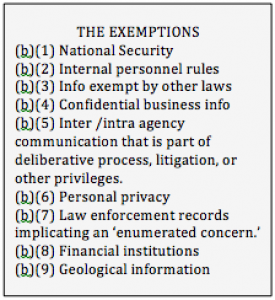A REPORTER’S GUIDE TO UNLEASHING E-DOCS (A.R.G.U.E.)
When you file a FOIA request, the government must justify every field, case or cell it plans to withhold with a statutory exemption. Under the 2016 FOIA amendments, they not only must show that a record falls under an exemption but also that release of the record would result in a specific, concrete foreseeable harm. Make them do what the law requires – and then be prepared to argue! Here’s how you can build a fast, persuasive legal argument.
STEP 1: OPPO RESEARCH Listen to the IRE Radio podcast (3 min)
FOIA.Gov has pages for each federal agency with information on where and how to send your public records request.
It also lets you see the most common exemptions deployed by each agency. You can use that information to prepare your argument ahead of time. Go to FOIA.gov Click on the Agency FOIA data tab and select “annual data.” Type in the agency name. For data type, select exemptions. Select a year or years. Click on “View report.” (You may need to click on “Print” or “CSV” to view all the exemptions due to a glitch in the website’s update.)
For example, #1 exemption for CIA in FY19 was 3, followed closely by 1. For Homeland Security, it was 7. For USEPA, as for many agencies, it was 6.
STEP 2: LEGAL RESEARCH Listen to the IRE Radio podcast (4 min)
You need to understand the exemptions — better than the FOIA officer does. Here are some helpful links unlikely to be in any but the most committed FOIA officer’s browser history:
US Department of Justice Guide to the Freedom of Information Act Provides an authoritative interpretation of each FOIA exemption, with case law and legislative history, chock full of language you can grab and quote. Who’s going to argue if the DOJ is in your corner? Take a look at Exemption 6 for clear guidance on how to design a FOIA request to combat overuse of the privacy exemption. The agency must consider whether the public interest in disclosure outweighs any privacy interest. DOJ Office of Information Policy has links to presidential and attorney general guidance on FOIA.
Reporters Committee for Freedom of the Press Federal FOIA Wiki. Always good to do a reality check on DOJ’s take on exemptions by comparing it to the more reporter-friendly RCFP. While quoting RCFP doesn’t have the same cache as DOJ in federal FOI officer circles, no need to say where you got that killer case law supporting release of the records you want.
RCFP & AP v FBI, a 2021 USCA-DC opinion that arms us with an expansive, and legally enforceable, interpretation of the 2016 FOIA amendments.
STEP 3: ARGUE Listen to the IRE Radio podcast (2 min)
If the interpretations above are in your favor, QUOTE them.
If they are not, ask for the records anyway.
- The FOIA officer may not know better.
- An exemption means the government MAY – not MUST — withhold a record. Remind the FOIA officer of this fact and press for the reason the administration doesn’t want them made public.
Consider consulting the DOJ interpretation when building your original FOIA request. For example, if you think the agency might withhold names in a database based on privacy, then be mindful in writing your request of the 4-step test in the DOJ guide that the feds are required to apply before withholding under Ex. 6.
STEP 4: SEEK HELP
The Office of Government Information Services is charged with overseeing federal agencies’ compliance with FOIA and helping the public resolve disputes. This is different and often faster than an appeal. Using it doesn’t waive your right to appeal.
— Deborah Nelson

1 ping
[…] FOI: A Guide to Freeing Data & Documents […]